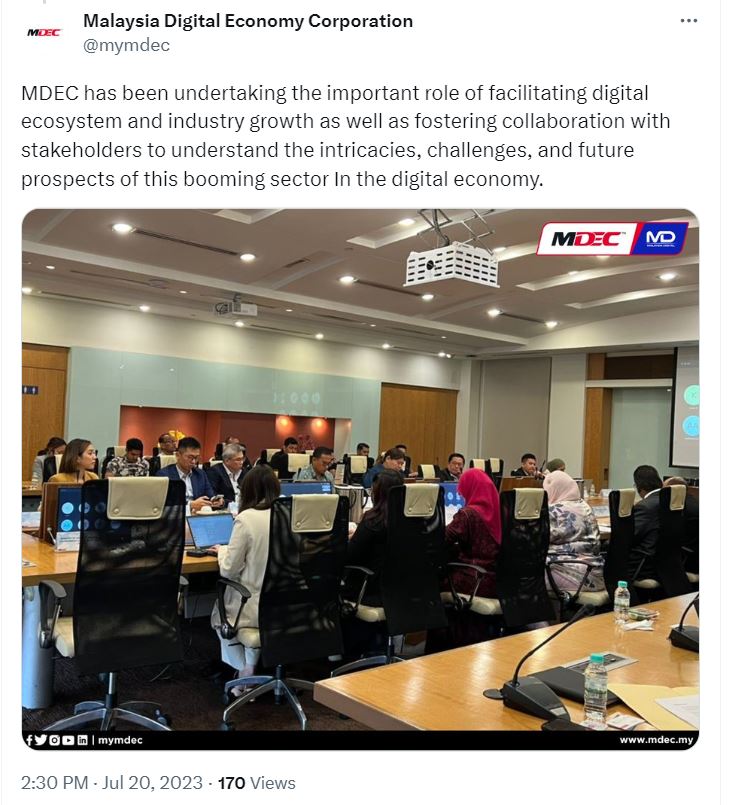Increasing adoption of cloud services in Malaysia

Rising utilization of cloud services in Malaysia. (Image – Shutterstock)
The cloud industry in Malaysia is thriving, particularly as domestic businesses strive to adopt digitalization and gain a competitive advantage. Amidst the pandemic, cloud services in Malaysia witnessed a surge in demand, enabling businesses to maintain operational continuity and stay pertinent in their respective sectors.

On a global scale, the increase in investment in cloud infrastructure in Malaysia is still a small proportion of the worldwide market of US$2.4 trillion for enterprise IT services.
In Malaysia, there has been an increasing need for cloud services, leading the government to authorize the establishment of more data centers to enhance the infrastructure. For instance, in February 2021, the Malaysian government gave the green light for Amazon Web Services (AWS), Google Cloud, Microsoft Azure, and Telekom Malaysia to construct new data centers within the country. This decision aligns with the government's cloud-first approach and the Malaysian Digital Economy Blueprint.
Based on Forrester's report titled The Status of Cloud in Malaysia by 2023, the growing number of hyperscalers creates an opportunity for businesses that want to target Malaysia's approximately 27 million internet users. Although Malaysian companies have dabbled in cloud technology before, the availability of local public cloud resources is now sparking greater interest in migration.
According to Sam Higgins, a Principal Analyst at Forrester, Malaysia has made significant changes to its economic openness in the past ten years. They have utilized their lack of old infrastructure, which can be found in more developed economies, to strategically invest in digital infrastructure. This strategy could potentially surpass Singapore in the long run. The success in both domestic and international cloud adoption can be attributed to the efforts of the Malaysia Digital Economy Corporation (MDEC) over the last decade. MDEC has focused on ensuring that there is enough private cloud capacity and a favorable business environment for the growing interest from international public cloud giants.

In this blog post, we will be hearing from Sam Higgins, a respected individual who holds the position of Principal Analyst at Forrester.
The article discusses various patterns related to cloud services in Malaysia. Firstly, it sheds light on the different kinds of cloud services that are being utilized in the nation. As the findings reveal, 65% of individuals responsible for making cloud-related decisions in Malaysian businesses are inclined towards utilizing two or more cloud deployment models. This includes employing a combination of hybrid cloud and public cloud. Additionally, it was observed that 84% of those utilizing the public cloud in Malaysia prefer using two or more vendors. This trend is not surprising, considering the distinct requirements and scenarios that each cloud vendor offers. Notable companies such as Standard Chartered Bank and Tenaga Nasional are exemplars of entities in Malaysia that embrace the public cloud.
In certain more advanced nations in the Asia Pacific region, businesses often deal with the burden of outdated systems or being tied to a single cloud provider. However, Malaysian businesses face a different kind of risk: having only one or two public cloud providers accessible within the country. This concentration of providers poses a challenge for technology leaders in Malaysia, as their colleagues in business demand cheaper and more efficient solutions than their current on-premise methods. In fact, this is the primary reason Malaysian business leaders seek to embrace cloud computing.
Additionally, businesses that are transferring their data and services tend to favor the use of the public cloud due to its ability to scale. This is because Malaysian companies moving their existing workloads have the opportunity to develop new applications on advanced data centers provided by major public cloud providers, ultimately leading to a decrease in overall costs. Notable examples of organizations that have already made this transition include Caring Pharmacy, Celcom, and the Department of Statistics Malaysia. On average, decision-makers in Malaysian enterprises report that they have moved 48% of their total application portfolio to the public cloud, with plans to increase that number to 64% within the next two years.

There is an intriguing new development on the horizon. While cloud services are being embraced more and more in Malaysia, only Alibaba currently has a cloud region in the country. However, Microsoft Azure made a significant announcement: they will invest a whopping US$1 billion and establish a cloud region in Kuala Lumpur. Other big players like AWS, Google Cloud, and Telekom Malaysia have also revealed plans to construct data centers in Malaysia. In fact, AWS has made a remarkable commitment to invest US$6 billion in the country by 2037. Until these new infrastructure developments are completed, organizations are relying on neighboring regions like Indonesia and Singapore, where the Personal Data Protection Act does not pose any concerns.
Malaysian businesses that are transferring their current workloads have the opportunity to create new applications using advanced data centers from leading public cloud providers, resulting in reduced overall ownership expenses. (Image - Shutterstock)
Additionally, the study also revealed that Malaysian enterprises, who are embracing cloud technology, have cited various reasons for doing so. These include enhancing their disaster recovery and business continuity capabilities, obtaining quick and effortless development resources, and receiving sustainable support. Given the alarming rise of data breaches in Malaysia, the emphasis on resiliency in their decision-making process comes as no surprise. Cybersecurity continues to be a significant worry in the nation, and Malaysian businesses are now recognizing the advantages of utilizing cloud services for backup and recovery purposes.
In Malaysia, the rise in cyber security incidents cannot be ignored. Even though numerous dedicated technology experts are tirelessly working to combat this issue, the growing importance of the digital economy, which contributes approximately 25% to the country's GDP according to the US International Trade Administration, has enticed criminals worldwide to engage in stealing personal and business information.

However, it is acknowledged that governments working together with private companies have the potential to do more in terms of safeguarding the digital independence of their citizens. Consequently, there is a growing focus on enhancing the skills and expertise of both public organizations and private businesses to tackle these risks. It is worth highlighting that although the use of cloud services can enhance the protection of the fundamental framework - known as cloud security- the concept of shared responsibility necessitates that businesses utilizing the cloud address their specific security requirements and guarantee security within the cloud," clarified Higgins.
MDEC has been enabling discussions for cloud service providers in Malaysia.
Additional patterns highlighted in the report are:
Due to global inflation and various economic uncertainties, cloud providers are starting to align their pricing with the US dollar. This means that some countries are experiencing both higher prices and a decrease in purchasing power due to weakening exchange rates. For instance, Microsoft recently announced that it would adjust local prices due to fluctuating currencies compared to the USD. As a result of these changes, there is an increasing interest among companies in "cloud repatriation." Although this trend hasn't yet significantly impacted the region, it is likely that the ongoing economic challenges will affect cloud adoption in the next year. This was concluded by Higgins.
Aaron finds pleasure in writing about enterprise technology in the area. He has participated in and reported on numerous local and global tech exhibitions, gatherings, and discussions, interacting with noteworthy figures in the tech field. Possessing more than ten years of media experience, Aaron has previously focused on reporting news related to politics, business, sports, and entertainment.



















